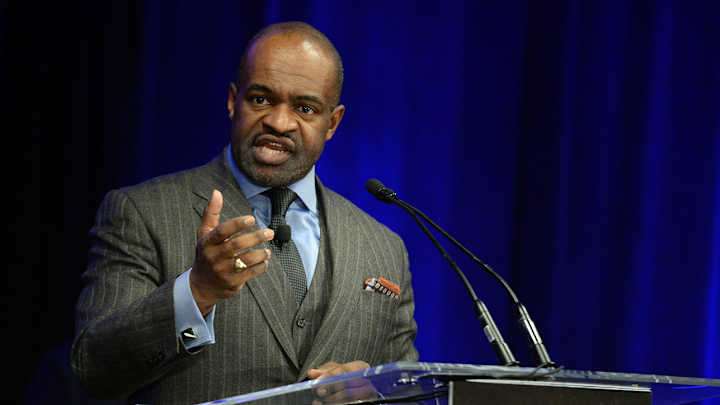How We Arrived at the Precipice of a 17-Game Schedule

INDIANAPOLIS— How did the NFL get to the precipice of a 17-game season? DeMaurice Smith, the NFLPA’s executive director, said Thursday morning that extending the NFL’s regular season by one game was the starting point for negotiations toward a new collective bargaining agreement between the league and the players.
“That’s a conversation I had with every team, that the league was conditioning an early deal on the 17th game, and that was a part of the package for an early deal,” Smith said, standing outside the NFLPA’s agent seminar at the Scouting Combine.
The 17th game has been central to the CBA talks, particularly since high-profile players and union reps Aaron Rodgers and Richard Sherman have spoken out against the extension of the regular season. In a statement posted to his Twitter account, Rodgers wrote, “16 games to me, was never something to be negotiated.” Both players said they voted no on the proposed deal, which needed a simple majority from player reps to go to a full membership vote.
“Democracy is messy,” Smith said. “I understand that Aaron is passionate, and he expressed his opinion. Other players have come out, and they are passionately expressing their opinion. It’s fine, and I would much prefer than for anybody to think that they didn’t have a voice, that they didn’t have a vote.”
Much of the focus has been on if the players are getting enough in return for the addition of the 17th game—a 1.5% increase in their share of the league’s revenue pot, improved benefits for current and former players, more practice restrictions, roster expansion and more—but it’s notable that the players’ most significant concession was where negotiations began. Smith said he conveyed during his visits to each team last year that this was the table-setter to get a deal done early, thus avoiding a work stoppage and implementing some of the other benefits in working conditions a year early. But in the same breath, he also conceded that a 17th game is something that none of the union’s membership would want.
“I get that,” Smith said, when asked about players who are opposed to 17 games, “and I think that no player would want to play an extra game. That’s why it’s been such a long, tortured process of talking about it.”
The proposal that the approximately 2,000 players will soon vote on—Smith did not give a definitive timetable for when that vote will take place—allows for the season to jump to 17 games no earlier than 2021. The extra game, in addition to two extra playoff contests, is appealing to ownership because of the increased revenue it will generate. But it also runs counter to steps the league and the union have jointly taken to better address the health and safety of current and former players. The preseason would be reduced to three games—and the number of allowed padded practices and joint practices will also be cut significantly—but to the surprise of some around the league, the 17-game season would still include only one bye.
Some in the room in Thursday’s agent meeting felt Smith emphasized the positive aspects of the proposed deal, while not doing enough to acknowledge its limitations. When speaking to the media, Smith emphasized the additional revenue that will go to players—he estimated the total is about $3.5 billion—and said that an important goal for this CBA was to better serve the 60% of players who are employed on minimum-salary contracts. This deal would increase minimum salaries $100,000 in the first year, and NFL Network reported that they would rise past $1 million for all players by 2029. The proposed CBA, which the owners already approved, will pass if more than 50% of players vote yes, and thus this core 60% would have the power to pass the deal. Some agents said they are recommending to their players that they vote yes for this reason.
But despite gains like these, the change to 17 games is a major one that could have short- and long-term effects on player health, as well as the lengths of their careers. Players around the league clearly have differing views on if they got enough in return from the owners. But some of the doubts come from what Smith admitted on Thursday: No player would want a 17-game season, but yet this CBA was negotiated without that major concession ever in doubt.
Question or comment? Email us at talkback@themmqb.com.
